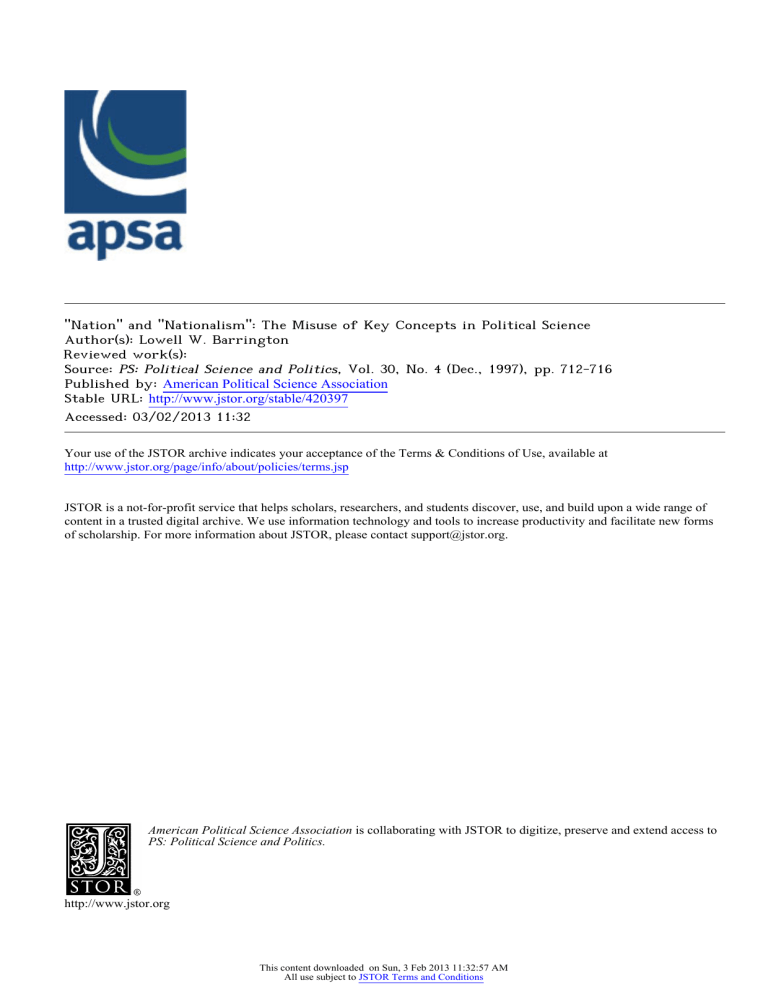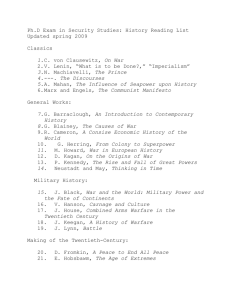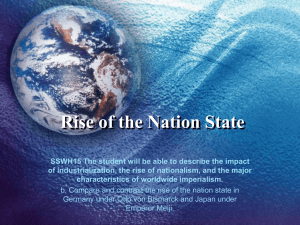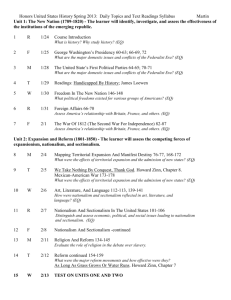"Nation" and "Nationalism": The Misuse of Key Concepts in Political
advertisement

"Nation" and "Nationalism": The Misuse of Key Concepts in Political Science Author(s): Lowell W. Barrington Reviewed work(s): Source: PS: Political Science and Politics, Vol. 30, No. 4 (Dec., 1997), pp. 712-716 Published by: American Political Science Association Stable URL: http://www.jstor.org/stable/420397 . Accessed: 03/02/2013 11:32 Your use of the JSTOR archive indicates your acceptance of the Terms & Conditions of Use, available at . http://www.jstor.org/page/info/about/policies/terms.jsp . JSTOR is a not-for-profit service that helps scholars, researchers, and students discover, use, and build upon a wide range of content in a trusted digital archive. We use information technology and tools to increase productivity and facilitate new forms of scholarship. For more information about JSTOR, please contact support@jstor.org. . American Political Science Association is collaborating with JSTOR to digitize, preserve and extend access to PS: Political Science and Politics. http://www.jstor.org This content downloaded on Sun, 3 Feb 2013 11:32:57 AM All use subject to JSTOR Terms and Conditions "Nation" and "Nationalism":The Misuse of Key Concepts in PoliticalScience* Lowell W. Barrington, MarquetteUniversity O ne of the essentialatartingpoints of anybranchof science is a consistent,broadlyunderstoodterminology.Generallyaccepted definitions of keytermswithina disciplineare importantin orderto judge claims by scholarsabout a giventopic. Fortunately,amongthosewho workon the topic of nationalism,thereis a growingconvergenceof definitions of "nation"and "nationalism."Unboth termsare oftenstill fortunately, misused,used loosely,or used inconsistently, especiallyamongthose in who discussthese science political termsin passing.Authorsof introductorytextbooks,who are carefulin theirusage of otherterms,oftenuse these twowordsin varying-and in different even contradictory-ways partsof the same book. Because of theirimportanceforthe discipline, however,politicalscientistsshould be verymindfulof theiruse of the terms"nation"and "nationalism."'] In thisarticle,definitions for"nation" and "nationalism"are profollowed posed, witheach definition by sectionson commonwaysthe termsare misemployedin political science.I provideexamplesof both misusesand "loose uses." While the line betweenmisuseand loose use is somewhatfuzzy(a pointreinforced below in the discussionof nationsvs. ethnicgroups),I considera misuse to be one in whichthe termis used in a way thatis completelyoutside how the termis used by nationalism scholars.A loose use is one in which the authorhas capturedonlypartof the conceptor has stretchedthe meaningof the termto an extreme degree. Of the two,whatI label misuses in thisarticleare the more problematic,especiallyforpolitical to learn science studentsstruggling definitions of importantconcepts. I propose are no The definitions more authoritative than anyothers in the nationalismliterature, but theyare consciouslybased on generallyaccepted ideas in the literature whose memtion is a "community bers share feelingsof fraternity, and exclusubstantialdistinctiveness, sivity,as well as beliefsin a common ancestryand continuousgenealogy" (1995, 425). While a good definition of an ethnicgroup,the lack of referselfence to the idea of territorial in and the difficulty determination on nations based fitting political ratherthanethnicidentityinto this conceptionof nationmake thisdefinitionunusable.6While an improvementover vague definitions that cannotdistinguish betweennations and classes, it is unclearhow a nafroman ethnicgroup tion differs this definition. using The importanceof the beliefin The Conceptof Nation territorial self-determination forthe Nation: A Definition groupis a centralpart of most definitionsof "nation" in the nationalWhetherone believesthatnationism literatureand providesan imalismscreate the idea of nationsor criterionfordifferentiating portant thatnationsdevelop the ideas rebetween nationsand othersocial one cannot lated to nationalism,3 discussnationalismwithoutconsider- categories.As Nodia puts it,"a nation is a community of people orgaingwhatone means by a nation. the idea nized around of self-determiYet, even the nationalismliterature nation" italics in original). 11, (1994, containsdifferent approachesto deSome take thisidea of self-determiwith the One term. fining problem nationto mean controlof a state.In definitions of "nation"in thisliteratureis the combinationof definitions anotherreviewarticle,forexample, Haas proposes thatthe nationis "a and causal arguments.Smith'sdefisociallymobilizedbody of individunitionof nationas a "named human als, believingthemselvesto be united historic terrian populationsharing that by some set of characteristics tory,commonmyths,and historical them their own differentiate a a mass (in memories, publicculture, to commoneconomyand commonleminds)fromoutsiders,striving or maintain their own state" create for all memand duties gal rights bers" (Smith1991, 14), forexample, (1986, 726). While othersmightnot is criticizedin a reviewarticleby agree thatthe nationmustpursue its own state,the idea of territory is Tamir (1995, 424) formixingtocrucialto understanding national gether"reasons forthe emergence of a nation(a shared historicterriidentity. Keeping in mindthese ideas, what tory,a commoneconomy,and a are some of the commonthreadsof commonlegal system)withthe reof "nation" in the the definitions sults(sharingmythsand historical nationalismliterature?Firstand memories)."4But, Smith'semphasis on culturalfeaturesis useful,and foremost,a nationis a collectiveof is common to most that people. This is a necessarydetail, something but one thatdoes not help us distinWhile criticalof Smith, definitions.5 Tamir puts forthan even more prob- guishbetweennationsand other For Tamir,a nalematicdefinition. groupsin society.What makes na- and designedto fitwithcircumstancesthatmostpeople who study the topicwould label nationalism.2 The examplesof misusesand loose uses in thisarticleare, of course, If one dependenton the definitions. the does not accept the definitions, criticismof misusesis unlikelyto be persuasive.That said, the definitions in thisarticleshould providea starting pointforbridgingdisciplinary and subfielddividesand help scholars begin to addressthe general problemof the varietyof uses of these termsin politicalscience. PS: PoliticalScience& Politics 712 This content downloaded on Sun, 3 Feb 2013 11:32:57 AM All use subject to JSTOR Terms and Conditions The MisueofKeyConceptsin PoliticalScience "Nation"and "Nationalism": tionsunique is thattheyare collectivesunitedbysharedculturalfeatures values,etc.) and thebeliefin (myths, therightto territorial self-determination.Thus, nationsare groupsof traitsand people linkedby unifying that the desire to controla territory is thoughtof as the group'snational homeland.7The beliefin the rightto territorial controlis centralto distinguishingnationsfromothercollectives.Many groupshold common values,and symbols(e.g., relimyths, gious groups,ethnicgroups,or even professionalassociations).But nationsare notjust unifiedby culture; theyare unifiedby a sense of purthat pose: controllingthe territory the membersof the groupbelieve to be theirs. Nation: Misuses The mostimportantand consistentmisuseof "nation"in political science is to equate it with"state" or "country."This misuseappears in a large numberof politicalscience worksincludingmanytextbooks. Worksin the Americanpoliticssubfieldare mostsusceptibleto this misuse,thoughbooks and articlesin comparativepoliticsand internationalrelationsare certainlynot immune. Internationalrelationsscholars seem to do better,possibly because of the importancethey place on emphasizingthe natureof statesin international politics,but the use of "nation"to mean "state" use of "nation" or the inconsistent (sometimesmeaninga "people," sometimesmeaninga "state") remainsan especiallyseriousproblem forscholarsin comparativepolitics. Inconsistentusage is found,forexample,in Almondand Powell's poptextbookforthe ular introductory studyof comparativepolitics.At the beginningof the book, the authors write,"Justabout the entiresurface of the worldtodayis coveredby independentcountries.We call them statesor nationsor nation-states." They thencontinue,"When we speak of a 'nation,'we referto the of a people based self-identification on the languagetheyspeak and the values, allegiances,and historical memoriestheyshare" (1996, 2, italics in original).Not onlydo these statements(on the same page) contradictthemselves,but in the pages thatfollowthe authorsgo back to using"nation"and "state" interchangeably,as tables are presented on the per capita GNP and portion of the populationin agricultureof "selected nations"such as Japan, Russia, Nigeria,and India. Even in the indexof the book, the entryfor "Country"reads,"See Nation(s).'"8 As discussedabove, "nation"is a termthatrefersto a collectiveof people. This is one pointin which definitions of nationin the nationalism literaturehave been unanimous, makingit all the more ironicthat nationis used verydifferently by so manyin politicalscience.A state,on the otherhand,is the principalpolitical unitin the international political systemcorrespondingto a territory, a relativelypermanentpopulation, A and a set of rulinginstitutions. the is territorial component country of the state.Nigeriais state (and a country);it is not a nation. That nationis used interchangeablywith"country"in everyday English is partof the problem.Because Americansare generallythoughtof as a "civicnation"(one is an American by means of United States citizenship),it is easy to associate "nation"withthe politicalunititself. Nevertheless,its use in commonlanforits guage is not a justification misuseby politicalscientists.Nothing is lost by using"state" or "country"if thatis what is meant.Much is lost if "nation"is used instead. Nation: Loose Uses The mostbasic loose use of "naof the tion" is the interchanging termand "ethnicgroup"or "ethnicity."I considerthisa loose use because nationscan evolvefromethnic groups,but it would not be a stretch to call it a misuse.A nationis more from than an ethnicgroup,differing such a groupbecause of a nation's conbeliefin its rightto territorial trol,or what Richmond(1987) calls its "territorial referent."Also, and more important, nationsneed not even be based on a certainethnic identity.Thus, the words"shared culturalfeatures"in the definitionof nationabove should not be read as "shared ethnicidentity."What are called "civic"or "political"nations in the nationalismliteraturehave sharedculturalfeaturesbut are genin theirmake-up.9 erallymultiethnic Americansshare certainculturalfeatures(originmythsand symbols,as well as-for mostpeople-language), but one of these featuresis certainlynot ethnicheritage.The factthatit is necessaryto discuss subgroupsof the Americanpopulationwiththe help of hyphenated Africanprefixes(Italian-Americans, Americans,etc.) demonstratesthat Americansas a nationare not unifiedin theirethnicidentity. The Conceptof Nationalism Nationalism:A Definition One set of approachesto the definitionof nationalismconsidersit to be an idea, belief,or principle.Ignatieff(1993), forexample,sees nationalismas a notionthatcombines the politicalidea of territorial selfthe culturalidea of determination, the nationas one's primaryidentity, and a moralidea of justification of action to protectthe rightsof the nation againstthe other.Gellner's definitionof "a principlewhichholds thatthe politicaland nationalunit should be congruent"(1983, 1) is a standardformanypeople who study the topic.Haas's definitionis even more basic: "a beliefheld by a group of people thattheyoughtto constitute a nation,or thattheyalready are one" (1986, 727). Motyltakes perhapsthe strongest stand in defendingnationalismas an idea, or, as he puts it, an "ideal." He arguesthatbecause nationalismis based on ideas-such as the nationnational state,self-determination, and nationalsuperiorityidentity, actionsbased on these ideas cannot be the basis fora definitionof nationalism,"unlesswe make the absurd assumptionthatbeliefsinvariablytranslateautomaticallyinto behavior"(1992, 311).1oYet, many "isms" (capitalism,socialism,terrorism,etc.) are based on ideas, and of these "isms" focus the definitions not on the necessaryideas but on the activitiesthatstemfromthem. While the idea of the marketis cen713 December 1997 This content downloaded on Sun, 3 Feb 2013 11:32:57 AM All use subject to JSTOR Terms and Conditions Features tralto capitalism,the existenceof such an idea alone is not what makes an economicsystemcapitalistic; rather,thatmarketprinciplesare practicedis the crucialingredient. Thus, one does not have to make an "absurd assumption"to includeactivitiesin the definition of a concept thatalso has importantideas at its core. The idea of nationalrights should not be thoughtof as nationalism withoutat least the open articulationof thisidea to the general population. A second,more usefulapproach to defining"nationalism"takes it to be a process.It is thoughtof as the creationof the unifying featuresof the nation,or the actionsthatresult fromthe beliefsof the group.1"Nationalismdefinedas an organized endeavorto controlthe national homeland,forexample,is common in the nationalismliterature.12 Some stressthatthisstrugglemustturnthe homelandinto an independentstate; otherswould stop shortof the requirementthatthe groupeven seek its own state,acceptingstrugglesfor territorial autonomywithinan existing state as nationalism.Nearlyall would agree,however,thatthe controlover one's own nation-stateis a goal formostnationalists.Less idealisticnationalistsmayrealize that an independentstate is not practical and seek somethingless thancombut they plete territorial sovereignty, would nearlyalwayspreferto have theirown state.Mellor's definition of nationalism-"thepoliticalexpression of the nation'saspirations,"inthat cludingcontrolover territory membersof the nation"perceiveas theirhomelandby right"(1989, 4-5, myitalics)-is thereforean improvement over the labeling of nationalism as simply an idea. It combines the ideas and the activities of nationalists. While concern with territoryis a necessary component of nationalism, many nations lay claim to a territory even when the members of the nation are not a majority in that area. Gellner's "Potato Principle" (roughly that groups will look back historically to periods when they were mainly farmers to justifythe control of land in an urban and industrial age) shows how territoryitself is imagined (see Gellner 1992). Just as thereare no predetermined nations, thereare no predeterminedhomelands. An interesting possible exception to thisstatementis federalsystemswhereterritorial unitsare named forethnicminorities.As the break-upsof the Soviet Union, Yugoslavia,and Czechoslovakiaalong the internallines createdby the Communistsmake clear, the federal natureof these Communistsystems was more than an illusion.The residentsof these territories oftenbelieved thatthe areas were homelands within thelargerstate(see Kaiser1994). Bringingthesevisionsof nationalism together,"nationalism"is definedhere as thepursuit-through or otheractivity-ofa set of argument membersof rights fortheself-defined thenation,including, at a minimum, territorial All autonomyor sovereignty. share two nationalisms,therefore, features:(1) theydefine,at least boundaries roughly,the territorial thatthe nationhas a rightto control and (2) theydefinethe membership boundariesof the populationthat makes up the nation-the groupthat deservesthisterritorial controland thatis entitledto the supremeloyaltyof othermembersof the collective.13These membershipboundaries are set by membersof the nation themselves,generallyby an intellectual or politicalelite,thoughthey maybe based on ideas of surrounding groupsas well. They establish the we thatpossesses the rightto controlthe homeland(and as a result the theythatdoes not share this right).This does not mean, however, thatthe boundariesare set easily. The developmentof successful claimsover boundariesmayinvolve struggleswithanothergroup,serious struggleswithinthe nationover comof the territorial petingdefinitions and membershipboundaries,and in transmitting the ideas of difficulty nationalmembershipboundariesto the masses. Nationalism:Misuses The mostbasic misuseof "nationalism" is to equate it with"patriotism."Justas a nationis a groupof people and not a state,nationalism is firstand foremostabout the nation,not the state.Because national- 714 ism includesthe pursuitof territorial control,and because the idea of the "nation-state"stilldominatesthe international it is easy state-system, to fallintothe trapof associating nationalismwithloyaltyto an existing state.The glossaryin Shively,for example,says thatnations"oftenbut not alwayscoincidewiththe political boundariesof states."Yet "nationalism" is definedin thissame glossary as "passionateidentification witha state on the partof its citizens" (1993, 357). While pride in one's state is not a bad definitionof patriotism,it is a bad definitionof nationalism.Likewise,pride in one's nationis not patriotism, and forthat matteris, at best,onlya partof nationalism. Nationalism:Loose Uses A commonloose use of "nationalism" is to missone of its two sides. Eitherit is thoughtof onlyas the or it is attemptto get territory thoughtof onlyas the emphasison a unifiednationalidentity.Textbooks in comparativepoliticsand even internationalrelationsare especially fondof the latter.Roskin and Berry, forexample,discussnationalismas "an exaggeratedsense of the greatness and unityof one's people" and (1997, 121). Unityis important, a sense of greatnessmaybe partof a particularnationalidentity.But it is not a necessaryfeatureof nationalism.Again, everynationalisminvolves the settingof membership and territorial boundaries. A second loose use of the term "nationalism"is to equate it with "ethnicpolitics."Rutland,forexample, definesnationalismas a "statementof claimson behalfof an ethnic group" (1994, 4). Like the discussionof "nation"and "ethnic group" above, ethnicpolitics(the politicalmobilizationof people based on ethnicity)can be a starting pointforsomethingthatbecomes nationalism,but it alone is not nationalism.Richmondmakes clear the difference betweennationalismand the politicalmobilizationof ethnic groups: An ethnicgroupwhenpolitically mobilizedcan havedifferent goals.These PS: PoliticalScience& Politics This content downloaded on Sun, 3 Feb 2013 11:32:57 AM All use subject to JSTOR Terms and Conditions "Nation" and "Nationalism":The Misue of Key Conceptsin Political Science the mayincludetherightto franchise, use oftheethnicvoteto swingresults in marginal constituencies. The achievement ofspecialstatusforparticularlanguages or religions (espetheremovalof ciallyin education), andtheenforcement ofhuinjustices manrights action codes,affirmative forpast programmes, compensation therestitution ofpropdeprivation, or therecognition ofspecial erty, from treatment suchas exemption moveservice."Nationalist" military suchclaims mentsmayalso establish butgo further in seekingto achieve within a givengeoself-government of graphicarea.... The politicization is notthesamethingas ethethnicity itmaylead nicnationalism although claimto a parto itwherea historical can be established ticularterritory (1987,4-5). One can extendthispointto cover the outbreakof conflict.Violent ethnic conflictsmayemergeover many actionpolicies, things(affirmative laws, language etc.). Nationalconflicts,on the otherhand,mustinvolve disputesover territory to be "national." truly Anotherimportantloose use of "nationalism"-because of its role in furtherconfusingstudentsand the casual observerof the nationalism literature-is the seeminglyinfinite numberof what I call "'something' nationalisms."Were one to count wordsatthe numberof different tached to "nationalism"in scholarly works(imperialnationalism,integral nationalism,etc.), it would be a truly impressivelist.14Again, keepingin mindthatnationalismis about two things-definingthe nationand definingits territory-helpsus make sense of the myriad" 'something' nationalisms"and also givesus a tool to decide whetheror not a certainmovementactuallyis nationalism. It is truethatone of these two featuresmaybe emphasizedmore thanthe other."Ethnicnationalism," forexample,is a legitimateterm when the nationalistmovementis mainlyemphasizingthe definitionof the membershipboundariesof the nationand is basingthisdefinition Likeon an existingethnicidentity.'5 wise,"separatistnationalism"would make sense ifthe nationalistsare concernedmostof all withjustifying the separationof a territory thatis partof an existingstate and the cre- ation of a new state.The problem comes whenone triesto fita circumstancethatis not nationalism into the categoryby amendingthe termwithan antecedentlabel. Thus, it is acceptable to attacha tag to nationalismifone has thought throughhow thismodifierfitswith the basic idea of nationalism.But especiallywhenbothpartsof the nationalismequation (definingthe membershipboundariesof the nation and pursuingcontrolof the territorialboundariesof the homeland) are emphasizedroughlyequally,it is bettersimplyto referto the argumentor activityas "nationalism"and avoid the use of the "something" labels. Conclusion Given the importanceof nationalism as a topic in comparativepolirelations,and the tics,international disciplineas a whole,thisarticlehas for"nation" presenteddefinitions and "nationalism"in the hope of and conpromptingmore thoughtful sistentusage of the termsin political incorscienceworks.The definitions areas of generalagreementin porate the nationalismliteratureand help highlight faultyor incompatibleusage of the termsin articlesand textbooks. It is not expectedthatreaderswill automaticallyaccept the definitions providedabove. And thereis certainlyno expectationthatsuch unwill make an impacton derstandings the use of the termsin non-academic settingssuch as newspapers. in the definitions of key Uniformity in any discipline conceptsis difficult (and impossiblein less formalsettings),wherepeople have learned and developed theirown ideas over time.But politicalscientistsmust stillconcernthemselveswithhow thosewho specialize in the studyof a topic like nationalismare using these keyterms.Politicalscientists mustalso look at whetherthey themselvesare usingsuch termscon'1 sistently. At a minimum,scholarsshould make clear how theydefinekey termssuch as these and thenuse themin waysconsistentwiththeir definitions. Failure to do thisin in- textbooksis inexcusable. troductory Even politicalscientistsreferring in and to "nation" "nationalpassing ism" in theirscholarlyworksshould With providetheirown definitions. all of the different often contra(and dictory)waysthatthese two terms are used, perhapsthe biggestloose use of "nation" and "nationalism"is to discussthemwithoutgivingdefinitions,assuminginsteadthatothers thinkabout themin a similarway. Notes *Special thanksto Mark Beissinger,Alexander Motyl,Ronald Suny,and Raju G. C. Thomas fortheirhelpfulcommentson this article. 1. It is outside the scope of thisarticle, and the area of expertiseof the author,to of otherterms,but there propose definitions is a definiteneed to addressthe problemof defcompeting(and sometimescontradictory) initionsfora varietyof basic conceptsin politicalscience. 2. As Haas (1986, 714) pointsout, even scholarswho writea greatdeal about nationalism often"fail to make anyseriouseffort to acknowledgeor use, leave alone integrate,the plethoraof existingworkson the subject." Yet, the problemis greaterforpoliticalscientistswho use these termswithoutbeing aware of the definitions and argumentsin the major workson nationalism. 3. Gellner(1983, 55), forexample,states that"nationalismengendersnations,"while Mellor (1989, 5) arguesthat"everynationhas its nationalism.' 4. The emphasison thingssuch as a common economyin thisdefinitionalso excludes membersof a diaspora community frombeing consideredpartof the nation.Given thatcmigres usuallyconsiderthemselvespartof the largernationand thattheyare oftenthe most "nationalistic"membersof thisnation,the idea thata nationmustshare an economyis Smith'sdefinitionis problematic.Interestingly, veryclose to thatof Stalin,who definedthe stable nationas "a historically constituted, of people, formedon the basis of community a commonlanguage,territory, economiclife, and psychologicalmake-up"(1994, 20). 5. Gellner (1983, 7), forexample,states thattwo people belong to the same nation"if and onlyiftheyshare the same culture." 6. Likewise,Connor's (1978) ideas about the nationwould be bettersuitedas a definitionof ethnicgroup.In fact,he has little problemusingthe termsalmostinterchangeis thata ably,statingthatthe main difference nationmustbe self-defined while an ethnic groupcan be "otherdefined." 7. Two pointsneed clarification. First, 'culture"here includesa broad rangeof traits and beliefs,and the particularones stressed by one nationmaydifferfromthose stressed by another.Second, not all membersof the 715 December1997 This content downloaded on Sun, 3 Feb 2013 11:32:57 AM All use subject to JSTOR Terms and Conditions Features nationneed live in the perceivedhomeland, and the groupdoes not need to have actual controlof its own state to be a nation. 8. Anotherintroductory textbook-Mayer, Burnett,and Ogden-discusses "nationsother thanthe United States" and uses France, ratherthantheFrench,to makethepointthat nationsare unique.But theauthorsthendefine "nation"threepages lateras "a largegroupof a people sharinga commonsense of belonging, commonpeoplehood"(1996, 1, 7-8). 9. The idea of politicalversusethnicnationsis not accepted by all nationalismscholars. Clearly,these are ideal types,withmost nationsfailingto meet eitherideal. But as ideal typestheyare usefulwaysto distinguish how one nationsees itselfand how its nationalism differs fromanothernation's.A classic workin thisregardis Brubaker(1992), where the authorpointsout the effectsof different ideas of nationhoodon the citizenshippolicies of Germanyand France. 10. An explanationof how nationalism spreads to the masses is one area wheremuch workon nationalismstillneeds to be done. For some interesting ideas about the spread of nationalism,see Beissinger(1996) and Connor (1990). 11. The creationof nationalidentitycan take place in different ways.Brass pointsout two possible routes:"Nationsmaybe created of an ethnicgroupin a by the transformation multiethnic state into a selfconsciouspolitical entityor by the amalgamationof diverse groupsand the formationof an inter-ethnic, compositeor homogeneousnationalculture throughthe agencyof the modernstate.Althoughthe two processesof nation-formation have different startingpointsand raise quite different kindsof analyticaland theoretical has been questions,the end resulthistorically sometimesthe same, and the two processes have muchin common"(1991, 20). 12. See, forexample,Brass (1991, 48), who says thatnationalism"is a politicalmovement There are a fewexamplesof by definition." people who eitherdo not see the territorial componentas a necessarypartof nationalism or who are loose in theirdiscussionof the role of territory. Suny'slabelingof Armenian nationalismin the early1900's as "non-territorial nationalism"standsas an exampleof the latter.By thisterm,he does not mean that Armeniannationalismhad no sense of the rightto a homeland,but ratherthatin reality the Armeniannationhad "lost its hold on its historichomeland"(Suny 1990, 14). 13. One mightbe concernedabout the simof ilaritybetweenthe proposed definitions "nation"and "nationalism."They are closely related(as we would expectthemto be), but theyare not the same thing.The factthata nationhas a sense of homelandis not the same thingas its pursuitof controlover that In addition,by settingthe memberterritory. ship boundaries,nationalismlaysout the of the people considereda nacharacteristics tion. It also sets the territorial boundariesof the homelandthat,as a nation,the group should control.But unless the people themselves accept these ideas-unless theybelieve theyare a nation-nationalismis doomed to fail.Thus, I would argue thatnationalisms (or, better,nationalists)tryto produce nations,but theyare in no way guaranteedsuccess. 14. 1 gave up afterfindingnearlythirty. I am sure thereare manymore. 15. A termsuch as "linguisticnationalism" mayalso be acceptable iflanguage is used to definemembershipin the nationand nationalistsare preoccupiedwiththe membership boundboundariesmore than the territorial aries. 16. As Motylputs it,"Internalconsistency is the goal" (1992, 308). References Almond,Gabriel,and G. BinghamPowell. 1996. ComparativePoliticsToday:A World View.6thed. New York: HarperCollins. Beissinger,Mark. 1996. "How Nationalisms Spread: EasternEurope Adriftand Tides and Cyclesof NationalistContention." Social Research63(1): 97-146. and Nationalism. Brass, Paul. 1991.Ethnicity London: Sage. and NaBrubaker,Rogers. 1992. Citizenship tionhoodin Franceand Germany.CamPress. bridge,MA: HarvardUniversity Connor,Walker. 1978. "A Nation is a Nation, is a State,is an EthnicGroup,is a .... Ethnicand Racial Studies1(4): 379-88. .1990. "When is a Nation?" Ethnic and Racial Studies13(1): 92-103. Gellner,Ernest.1983.Nationsand Nationalism. Ithica,NY: Cornell UniversityPress. .1992. "Nationalismin the Vacuum." In ThinkingTheoretically about SovietNaed. AlexanderMotyl.New tionalities, York: Columbia University Press. Haas, Ernst.1986. "What is Nationalismand WhyShould We StudyIt?" International Organization40(3): 707-44. Michael. 1993. Blood and Belonging: Ignatieff, intotheNew Nationalism.New Journeys York: Farrar,Straus,and Giroux. Kaiser, Robert. 1994. The Geography of Nationalismin Russia and the USSR. Princeton: PrincetonUniversity Press. Mayer,Lawrence,JohnBurnett,and Suzanne Ogden. 1996.ComparativePolitics:Nations 716 and Theoriesin a ChangingWorld.2nd ed. Upper Saddle River,NJ: PrenticeHall. Mellor, Roy. 1989.Nation,State,and Territory: A PoliticalGeography. London: Routledge. RationalMotyl,Alexander.1991. Sovietology, ity,Nationality: Comingto GripswithNationalismin theUSSR. New York: Columbia University Press. . 1992. "The Modernityof Nationalism: Nations,States and Nation-Statesin the World."Journalof InternaContemporary tionalAffairs 45(2): 307-23. Nodia, Ghia. 1994. "Nationalismand Democand racy."In Nationalism,EthnicConflict, Democracy,ed. LarryDiamond and Marc F. Plattner.Baltimore:JohnsHopkins UniversityPress. Richmond,Anthony.1987. "EthnicNationalism: Social Science Paradigms."InternationalSocial ScienceJournal111:3-18. Roskin,Michael, and Nicholas Berry.1997. IR: The New Worldof International Relations.3rd ed. Upper Saddle River,NJ: PrenticeHall. Rutland,Peter. 1994. "State Failure and State Buildingin Post-SocialistEurope: ImplicationsforTheories of Nationalism."Presented at the Annual Meetingof the AmericanPoliticalScience Association, New York. Shively,W. Phillips.1993. Powerand Choice: An Introduction to PoliticalScience.3rd ed. New York: McGraw-Hill. LonSmith,Anthony.1991. NationalIdentity. don: PenguinPress. Stalin,Joseph.1994. "The Nation." In Nationalism,ed. JohnHutchinsonand Anthony D. Smith.Oxford:OxfordUniversity Press. Suny,Ronald. 1990. "Revenge of the Past: Socialism and EthnicConflictin Transcaucasia." New LeftReview184:5-34. Tamir,Yael. 1995. "The Enigma of Nationalism." WorldPolitics47(3): 418-40. Aboutthe Author Lowell W. Barringtonis assistantprofessorof His politicalscience at MarquetteUniversity. specializationsincludepost-Communist politics and comparativedemocratization, witha particularinterestin nationalismand ethnic conflict.He is currently workingon a book titledNationalIdentity and International Organizations:The Makingof Citizenship Policyin theBalticStatesand Ukraine.Barringtonis also editorofAnalysisof Current Events.His e-mail address is: barringtonl@vms.csd. mu.edu. PS: Political Science & Politics This content downloaded on Sun, 3 Feb 2013 11:32:57 AM All use subject to JSTOR Terms and Conditions
![“The Progress of invention is really a threat [to monarchy]. Whenever](http://s2.studylib.net/store/data/005328855_1-dcf2226918c1b7efad661cb19485529d-300x300.png)





